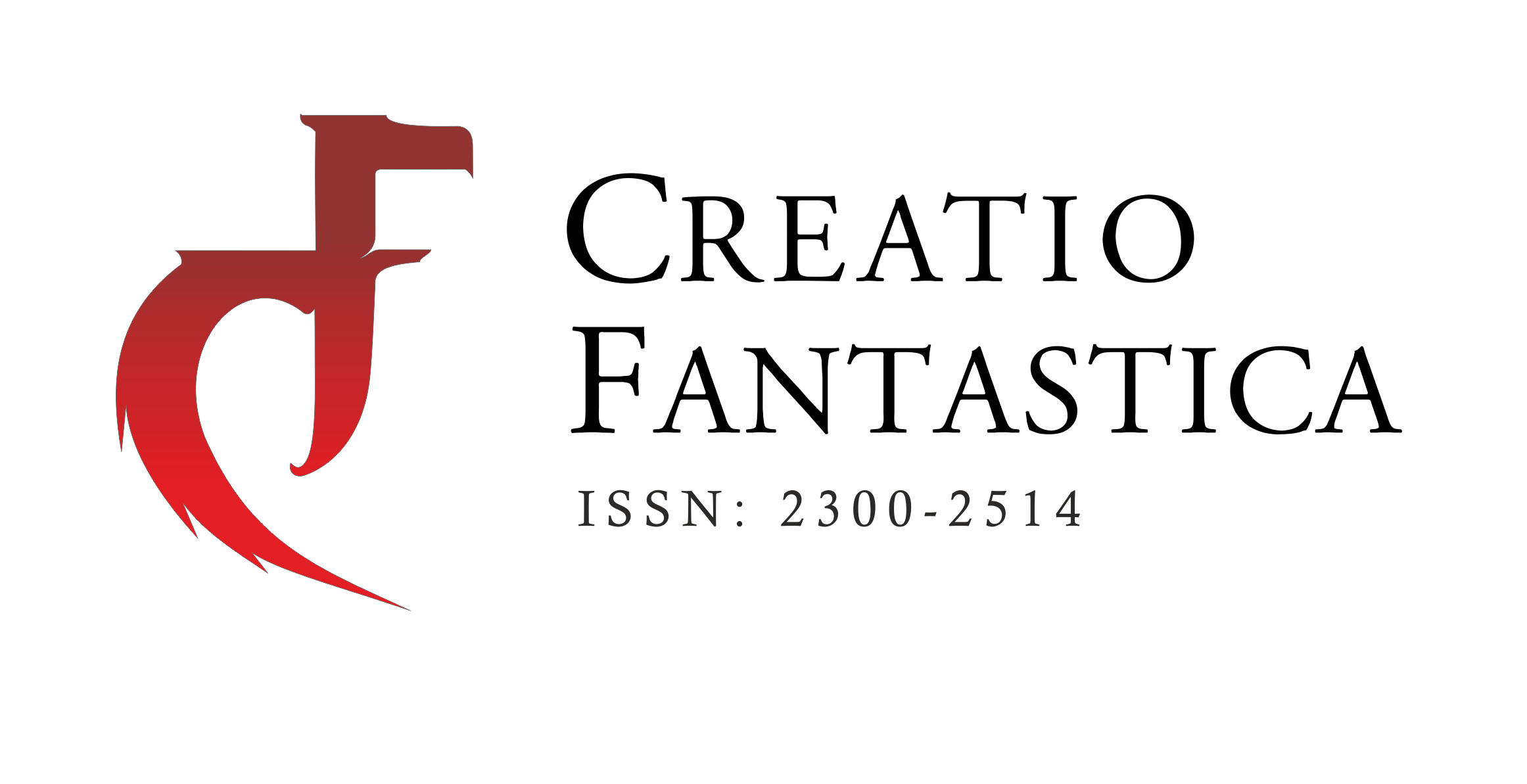Creatio Fantastica
Creatio Fantastica
Publishing House: Ośrodek Badawczy Facta Ficta
Subject(s): Philosophy, Language and Literature Studies, Cultural history, Media studies, Music, Visual Arts, Studies of Literature, Philosophical Traditions, Aesthetics, Comparative history, Cultural Anthropology / Ethnology, Film / Cinema / Cinematography, Philology, Theory of Literature
Frequency: 2 issues
Online-ISSN: 2300-2514
Status: Ceased Publication
- 2016
- 2017
- 2018
- 2019
- Issue No. 2/53
- Issue No. 3-4/54
- Issue No. 1/56
- Issue No. 2/57
- Issue No. 1/58
- Issue No. 2/59
- Issue No. 1/60
Articles list
{{ article.TitleOriginalLanguage }}
{{ article.TitleOriginalLanguage }}
({{ article.TitleEnglish }})
- Publication: {{ article.Publisher }} ({{ article.Issue }})
- Author(s): {{ article.Authors }}
- Contributor(s): {{ article.Contributors }}
- Language: {{ article.Language }}
- Subject(s): {{ article.Subjects }}
- Issue: {{ article.Issue }}
- Page Range: {{ article.PageRange }}
- No. of Pages: {{ article.NumberOfPages }}
- Keywords: {{ article.Keywords }}
- Summary/Abstract: {{ article.SummaryAbstract }}
- Price: {{ common.currency(article.Price) }}
Short Description
„Creatio Fantastica”, established in 2005, is an academic and literary journal published by Facta Ficta Research Centre non-profit foundation. Both the editorial and advisory board comprises scholars dedicated to the research in the fantasy, science fiction, and popular culture studies.
“Creatio Fantastica” publishes thematic monographic issues twice a year, each time releasing not only academic articles, contributing to the studies in the fantastic, and reviews of the most important books in the field, but also conversations with experts on the leading subject of the issue. As for today, “CF” has presented issues on utopias and dystopias, horror and gothicism, steampunk, posthumanism, young adult fantastic fiction, or fairy tales. Additionally, since 2015, the journal publishes issues narrowed to the analysis of life and works of the most important fantastic writers (most recently: Howard Phillips Lovecraft and John Ronald Reuel Tolkien).
Since its inception, “Creatio Fantastica” editors have been engaged in publishing short stories, from 2014 published in a special section “Litterrarium”. The effort of promoting valuable and promising fiction was recognized in 2015 with the launch of the series “Creatio Continua” which is meant to feature thematic anthologies of both classical and contemporary Polish fantastic fiction.
Editorial board
Redaktor naczelny
dr Krzysztof M. Maj (AGH w Krakowie)
Sekretarz redakcji
Mariola Lekszycka
Kolegium redakcyjne
dr Jakub Alejski (Uniwersytet im. Adama Mickiewicza w Poznaniu)
dr Anita Całek (Uniwersytet Jagielloński)
Anna Dziadzio
dr Sylwia Borowska-Szerszun (Uniwersytet w Białymstoku)
Magdalena Łachacz (Uniwersytet Śląski)
dr Krzysztof M. Maj (Akademia Górniczo-Hutnicza w Krakowie)
dr Ksenia Olkusz (Ośrodek Badawczy Facta Ficta)
Alicja Podkalicka
dr Mateusz Tokarski
Magdalena Wąsowicz (Uniwersytet Jagielloński)
Piotr Zawada
Konrad Zielonka (Uniwersytet Śląski)
Publicyści
dr Renata Iwicka (Uniwersytet Jagielloński)
Daria Chibner
Mateusz Hupert
dr Wojciech Lewandowski (Uniwersytet Warszawski)
Monika Pawełek
Maciej Tomczak
Redaktor językowy
Alicja Podkalicka
Redaktorzy języków obcych
Magdalena Wąsowicz (j. angielski)
Magdalena Łachacz (j. francuski)
Korekta
Alicja Podkalicka
Kaja Jaroszewska
Magdalena Paluch
Wiktoria Wolska
Redaktor statystyczny
Beata Fijołek-Soska
Advisory Board
prof. Ludmiła Gruszewska-Blaim (Uniwersytet Gdański)
dr Mirosław Gołuński (Uniwersytet Kazimierza Wielkiego w Bydgoszczy)
prof. Kenneth Hanshew (Universität Regensburg)
dr Mariusz M. Leś (Uniwersytet w Białymstoku)
dr Tomasz Z. Majkowski (Uniwersytet Jagielloński)
prof. Magdalena Roszczynialska (Uniwersytet Pedagogiczny w Krakowie)
prof. Piotr Stasiewicz (Uniwersytet w Białymstoku)
prof. Izabela Trzcińska (Akademia Górniczo-Hutnicza w Krakowie)

